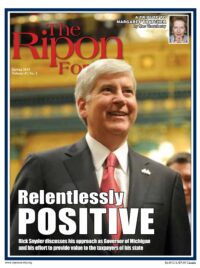
Three years ago, businessman Rick Snyder was a virtual unknown in the political world. When he first decided to run for governor, his standing in the polls was so low that taking the margin of error into account, he theoretically could have had negative numbers. Political pundits said there was no way he could compete against the better known field of experienced political rivals.
The pundits were wrong.
Snyder – who built Gateway into a Fortune 500 company as its CEO — won in a landslide victory after running as “One Tough Nerd” ready to make the tough decisions career politicians refused to make. The tactic led one particularly snarky pundit to quip “I guess nerd tested better in the focus groups than dork.”
As a candidate, Gov. Snyder pledged to eliminate the job-killing Michigan Business Tax and replace it with a flat, 6-percent corporate income tax that is simple, fair and efficient. He pledged to structurally balance the budget without using accounting gimmicks or quick fixes. He pledged to create an environment where small businesses can grow and create jobs.
The businessman-turned-politician has delivered. Working together with lawmakers, the governor eliminated the state’s $1.5 billion deficit and produced a budget surplus. And in stark contrast to the partisan fighting that led to two government shutdowns under his predecessor, Gov. Snyder got the budget done by the earliest date it has been completed in 30 years.
The Forum spoke with the Governor recently about his record, and how the lessons he learned as the Chief Executive Officer in the private sector apply to his current role as the Chief Executive of Michigan.
∗∗∗∗∗∗∗∗∗∗∗∗∗∗∗∗∗∗∗∗∗∗∗∗∗
RF: You’ve talked a lot about applying business principles to government. As you approach your 30th month as Governor of the State of Michigan, which principles do you find are most applicable to the job you are doing today, and which if any have you found are not applicable at all?
Governor Snyder: I’d start with the second piece because that’s relatively straightforward. The part that’s not applicable is that profit is not a motive. When you’re in a business, profit is a motive and it needs to be, because that ensures the sustainability of the organization. In the context of the government or the public sector, that is not applicable
The other principles apply, with probably one of the most important principles being the whole concept of customer service. I think that’s something I emphasized when I spoke to The Ripon Society, but that’s something I do in almost every speech I do. When was the last time we had a thoughtful, broader discussion about why does government exist? And when you get down to it, the purpose of having government — and there is reason to have government — in many respects, is to give great service to our customers.
The way I like to view it is that if you step back and look at it from an individual’s point of view — a citizen-customer point of view – is that I want people to feel like they bought the right amount of government. Because we’re a unique provider.
When you get down to it, the purpose of having government … is to give great service to our customers.
RF: With government approval ratings at or near an all-time low, how much do you think these ratings are driven by one of the principles you’ve also talked about quite a bit – and that’s value, and the fact that people increasingly do not think they are getting much in return for their hard-earned tax dollars.
Governor Snyder: I think there are two parts to that. I think you said it well. I think a lot of it is that people don’t make the connection to the value they are receiving, and that makes it more challenging. A couple of other pieces I would add to that, though, that tie into some of the other principles we work under, is that I think things have gotten too much about people simply fighting and blaming one another as opposed to simply solving problems.
After customer service, one of the other basic principles we operate under here is relentless positive action — no blame, no credit, simply solving problems. And that’s made a huge difference here in Michigan, because we don’t waste time on the blame game. Think about Washington – if people stepped back and said no one would blame anyone and no one would take credit. The press might have to find something else to write about, but they’d have a whole lot more time where they’d actually be solving problems. And I think people are fed up with that.
The third thing I would add to you, though, is that when you do get to solving those tough problems, it’s that one thing I would say in Michigan is that if you look at polling numbers in Michigan, people would say that you’re polling numbers are not so high. My response is that asking people to change is difficult. Everyone likes change until it involves them. That’s just part of human nature. But what you find is that you get it in place and you move forward and you try to be articulate about the rationale for why you make it and you find that after some period of time people do come around and say “Yeah, we really did need to do that.”
Like the displays of key variables constantly before drivers’ eyes – speed, oil pressure, fuel level, etc. – Snyder’s web-based dashboards display measurements of the states’ economy, finances, education system, public safety, health and wellness, infrastructure, environment, and quality of life in a way that allows easy year-by-year comparisons. Users can drill down to reveal a total of 165 metrics (by my count). Numbers trending the “right” way get a green thumbs up. The others get a red thumbs down. It doesn’t look like a government website.
Two things are notable about the dashboards. The first is that they exist at all. It’s bold and admirable for a governor to publicly declare, shortly after election, the precise measurements by which he invites voters to judge his performance, and then to make it easy for voters to monitor those measurements. But it is the kind of thing a CPA-cum-businessman might suggest.
After customer service, one of the other basic principles we operate under here is relentless positive action — no blame, no credit, simply solving problems.
RF: How have you tried to provide the people of Michigan with value for the tax dollars they pay to your state?
Governor Snyder: Well, I’ll give you a great illustration of that — and I can give you several. It’s called “Pure Michigan Business Connect.” It’s one of our economic development programs. The traditional model for government in our country is to give out tax cuts. They give huge tax credit deals to somebody who comes out to do business to have jobs created in their state.
We wiped out basically our tax credit programs. We kept some strategic dollars to have some ability to participate. But one of the other alternatives we created is Pure Michigan Business Connect, which is the concept of basically a good neighbor policy. It’s about being a facilitator, where we bring Michigan businesses together to find out how they can buy and sell more from each other.
We started with our two big utilities in the state — BPE and Consumers. Just over the last couple of years, they’ve bought over a billion dollars in additional goods and services from Michigan companies incrementally more than they bought before. That accounts for thousands of new jobs in our state. And it was really just getting people together to talk. It’s gone so well that we’re getting a number of the big automotive companies and the tier one suppliers participating. Ford just did an event recently with their suppliers and they came up with over three hundred proposals they can bid on. And there were over six hundred and some meetings done in one day with Michigan companies on bidding on those. That’s just great stuff.
RF: Talk about your dashboard for a moment. Why did you create it, and what role does it play in providing taxpayers with a sense of value and a better understanding of how their tax dollars are being spent?
Governor Snyder: Well, it’s critically important. If you can’t measure, how do you know how you’re doing? Politicians in general run from measurements and dashboards and metrics because they figure it’s a way they can get in trouble.
My view is how do you celebrate success — to know you achieved goals and made progress, and how do you share that and communicate that if you don’t have a dashboard with good metrics to use?
Politicians in general run from measurements and dashboards and metrics because they figure it’s a way they can get in trouble.
RF: You’ve required local governments in Michigan to also establish dashboards as a condition of receiving assistance from the state. How has this worked? Have you received much pushback, or have most local governments largely complied?
Governor Snyder: The answer is yes — people have complied. It’s been successful, but we’ve gotten pushback too. Again, you’re asking for change, and some people just don’t like the whole measurement concept. My view is you shouldn’t look at it as a way to not show how you’re failing, but how you’re succeeding.
What I would say, too, is that we’re still in the first stages of doing this. We’ve got all kinds of dashboards and scorecards, but we’re going to go through and clean them up. My first view was to get a whole bunch out there and see which are the most important ones as we go through the process. So it’s continuous improvement.
RF: What about Detroit? What kind of dashboard or system of metrics are you using there?
Governor Snyder: We’re still working on establishing that. We have an emergency manager there now, and that will be part of the planning process. But we will have metrics and a dashboard to judge progress. Because that’s fundamentally the issue — one of the major failure points, in addition to financial management challenges and the balance sheet issues, is that we need to provide better services to citizens. And those are things that you can use dashboards to measure effectively.
What metrics and dashboards are good at are identifying successes or problem areas.
RF: One of the other principles you talk about is accountability. In some respects, it is a principle that goes hand in hand with value because it is based on doing what is needed and what is right. How do you enforce that principle in government when, in some cases, union rules make it difficult — if not impossible — to fire government employees for poor performance and hold government employees accountable for their work?
Governor Snyder: I view it as, fundamentally, most people want to do the right thing. It really gives you an opportunity if you’re measuring to sit down with them and say, “Here’s the problem.” I don’t view it as union versus management. I view it as, “Let’s define the problem.”
What metrics and dashboards are good at are identifying successes or problem areas. You don’t do it in the context of saying “I have a disagreement with you, here’s how I want to argue.” It’s more stepping back to say, let’s put it in the context to say “hey, we’re succeeding so let’s celebrate together and set new goals.” Or if we’re not succeeding together, “What is the problem?”
Let’s not talk about what difference we have, but how we can collectively solve that problem. And if you’re not part of the solution, we need to talk about how we get something in place to solve that problem.




